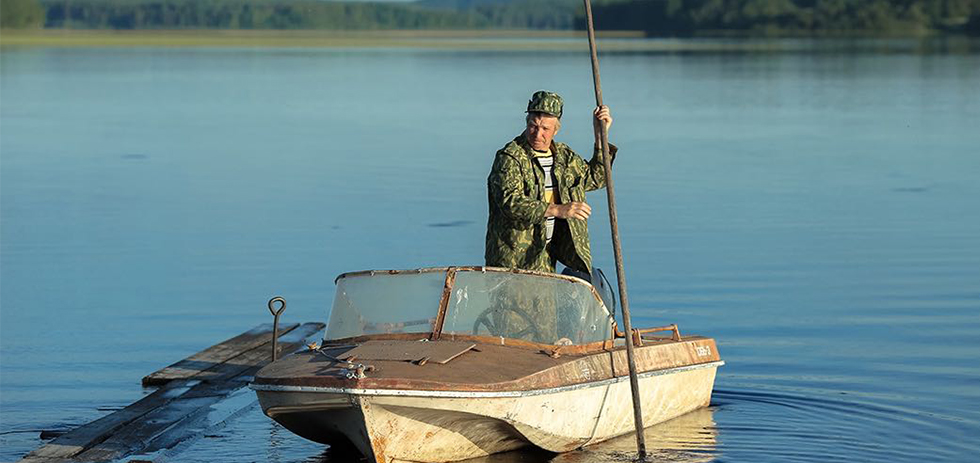Andrei Konchalovsky’s first feature length movie, The First Teacher, was released in 1964 in Russia. In a way, it feels like The Postman’s White Nights – which was released in the same country in 2014 – is a celebration of Konchalovsky and cinema’s 50th anniversary. Markedly minimalist, the directors latest work is reflective, slow-paced, and anti-climactical in ever sense of the word. Perhaps overcautious at times, the film never tries to be anything more than a survey of a small isolated village in the north of Russia. It’s hard to imagine such a specific sort of countryside mundanity being anything but exhausted, however, Konchalovsky’s experience as a director is palpable throughout and an astounding and deeply characteristic film ensues.
At the centre of The Postman’s White Nights is Aleksey Tryapitsyn’s placement as the titular ‘Postman’. From the start, he’s a deeply likeable misfit. He’s concerned with doing his job as a postman, and little else. He’s defined by a deep-seated apathy that sits in congruity with the atmosphere that defines Konchalovsky’s countryside. A relationship would be nice, but Postman doesn’t mind the alternative. Konchalovsky characterises him as something phenomenologically different from a womaniser, and something quite separate from lonely at the same time. In a series of character establishing scenes, Postman delivers mail and packages to various women at the start of the film. In a repeatedly cycle, he tells each one he’s sorry to hear about their break up, asks if they’re free to go on a date, and chuckles to himself as he walks out of the building after being promptly informed split up from their partner at all.
Though much has been made of the choice to employ non-actors, with some hailing the film as ‘docu-fictional.’ The Postman’s White Nights is pierced by moments of absurdity that take the film to the border of surreal, carefully maintaining the composure not to cross it. At the start of the film he hallucinates a cat, and it returns at the end as well, playing no significant to the plot at all. Both of these play off as Konchalovsky’s subtle inversion of cinematic form and audience expectation. The audience is expecting something exceptional and weird to happen, they’re expecting Postman to have a deeply romantic encounter, and the director leads the audience towards these possibilities, before removing them in a thematic gesture that calmly reflects Postman’s outlook.
Irina Ermolova plays a woman that shares her name, while Timur Bondarenko plays her son, again sharing the name of the actor that portrays him. Irina is a potential love interest at several stages of the film, but unlike Postman, she has a desire to leave the village. He doesn’t seem phased by the lack of romantic development, and Konchalovsky creates a far more likeable character in Postman; with the director creating a respectful character over needlessly falling into a teleology of romance to remove the lack of development throughout the film.
Prioritising portraiture over its plot, The Postman’s White Nights is a slow-moving, peculiar film that settles itself into the rhythm of a tiny village in remote northern Russia immediately: the opening scene is the postman himself thumbing through photographs and remembering them aloud. “This is the whole village,” he remarks over a photo of four, “although these two are dead now.” Timur and Postman’s interactions are forthcoming, respectful and sweet in their simplicity and reinforces both of them as outsiders. Timur has few friends as there aren’t many children in the town, while Postman finds most of his encounters with the adults tiresome – as they drink endlessly, while Postman has been sober for two years. The two go on deliveries as Postman becomes a sort of mentor as one of the few villagers that has a strange sort of purity to him.
Everything in Konchalovsky’s film lends itself to this certain brand of self-aware Russian realism flirting with surrealism in a way that only employs the latter to enforce the former. The film doesn’t meander on, and serves as a brief portrait of an isolated, detached but overwhelmingly content life. It’s a special film in its reflexiveness and operates as a poignant piece to sit towards the later period of Konchalovsky’s extensive career. It’s slow-moving, for sure, but the simplicity and solace of the world portrayed sticks with the audience long after the screen has turned off.
Around the Staff
| Matilda Surtees |

